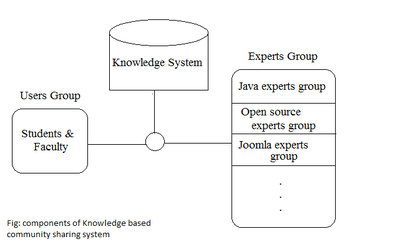Knowledge based community sharing system

Knowledge Based Community Sharing System(KBCSS)[1] is one of the standard project scenarios of IBM's THE GREAT MIND CHALLENGE 2011.Conceptualized by Mr.Karthick Lokala and Mr.P.D.K Pavan kumar under the team name KP's eagle software solutions during their graduation in 2010 at KL University,Guntur, AP, India.
Concept
Today most of the educational institutions in India are understaffed and does not have a basic interaction with industry. It now exists in such a way that Industries are now not part of the education system. Providing an environment for students/faculty/researcher/industry experts will drive us to make up an online knowledge centre for education and research. The basic idea of KBCSS is to provide an environment for the students and faculty of a university to enhance their technical skills and to share their knowledge with their fellow students or faculty/researchers/industrial experts. It also aims to provide a platform for mutual cooperation between different kinds of users, learning by mining(i.e., previous discussions are a source which is studied). The system was proposed to replace the existing e-learning systems of many universities and colleges which are unidirectional i.e., from faculty to students to a bidirectional way i.e., also from student to faculty.
Traditional e-learning features
The system offers all the traditional e-learning features like file uploads/downloads, videos on subjects and experiments, discussion manager and search facilities. The base of these traditional e-learning system is from Learning Management System(LMS).
Learning by mining
The source of knowledge in the system is by using the DISCUSSION MANAGER component. The discussion manager acts as a source of knowledge. The knowledge can be mined and can be processed to create notes for a particular topic in a subject. An efficient data mining algorithm is formulated to create the concept of Learning by mining. A lot of extensive research work is being carried out in this part of Knowledge Based Community Sharing System.
Groups
The GROUPS are the backbone to the Knowledge Based Community Sharing System. The entire user set is divided into a well defined subset. The subsets are students/researchers, Faculty, Industry experts and HR managers. The group manager is a module in the software that deals with the creation, deletion and group migrations. Migration of one group to other group should be possible whenever needed. For example, a researcher can become an expert in course of time and the system should allow with ease in transition. An administrator is the controller of the group manager requests.
Dynamic Video Discussion Manager
Most of the e-learning features are static. The best example are videos. Site like NPTEL[2] in India are created with the help of premier institutes governed by Government of India in a view to improve the quality of educations at small Universities. The nptel site contains a number of videos that are lectures of top faculties in the premier institutes of India. It is unidirectional in nature.
To make interactive learning possible in Knowledge Based Community Sharing System, the video is check pointed in its time line. The discussions are allowed by students during the time line of the video and the lecturer can answer based upon the time line of video and the checkpoints mentioned in the video. This type of method improves the learning process of students.
Knowledge Based Community Sharing System and IBM
The project of Knowledge Based Community Sharing System created by Karthick lokala and P.D.K Pavan kumar is awarded into IBM's HALL OF FAME for being in top-3 of IBM's THE GREAT MIND CHALLENGE (TGMC).[3][4] It is chosen as a standard scenario in TGMC for the year 2011. The system is creating a new wave in e-learning domains by providing innovative thoughts to nurture the learning activity with application of advanced methods. A good set of teams are working to create the standard e-learning model using the Knowledge Based Community Sharing System.